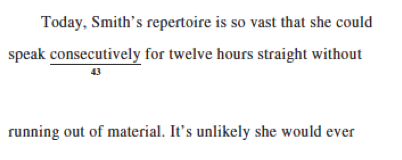
Are you scoring in the 26–34 range on ACT English? Do you want to raise that score as high as possible—to a perfect 36?
Getting to a 36 ACT English score isn't easy. It'll require near perfection and mastery of both grammar rules and rhetorical skills. But with hard work and my ACT English strategies below, you'll be able to do it. I've consistently scored 36 on English on my real ACTs, and I know what it takes. Follow my advice, and you'll get a perfect score—or get very close.
Brief note: This article is suited for students already scoring a 26 on ACT English or above. If you're below this range, my "How to Improve your ACT English Score to a 26" article is more appropriate for you. Follow the advice in that article, then come back to this one when you've reached a 26.
Overview
Most guides on the internet on how to get a 36 on ACT English are of pretty bad quality. They're often written by people who never scored a 36 themselves. You can tell because their advice is usually vague and not very pragmatic.
In contrast, I've written what I believe to be the best guide on getting a 36 available anywhere. I have confidence that these strategies work because I used them myself to score a perfect ACT English score consistently. They've also worked for thousands of my students at PrepScholar.
In this article, I'm going to discuss why scoring a 36 is a good idea and what it takes to score a 36. Then I'll go into the 10 critical ACT English strategies you need to get a perfect ACT English score.
Stick with me—as an advanced student, you probably already know that scoring high is good. But it's important to know why a 36 English score is useful, since this will fuel your motivation to get a high score.
In this guide, I'm going to talk about doing well on ACT English, rather than about raising your combined English/Language Arts score. The reason is that schools typically care much more about your ACT composite score rather than your subscores and ELA score. However, I'll still touch upon how to raise your essay score at the end.
Final note: In this guide, I talk mainly about getting to a 36. But if your goal is a 34, these strategies still equally apply.
Understand the Stakes: Why a 36 ACT English?
Let's make something clear: for all intents and purposes, a 34 on an ACT is equivalent to a perfect 36. No top college is going to give you more credit for a 36 than a 34. You've already crossed their score threshold, and whether you get in now depends on the rest of your application.
So if you're already scoring a 34, don't waste your time studying trying to get a 36. You're already set for the top colleges, and it's time to work on the rest of your application.
But if you're scoring a 33 or below AND you want to go to a top 10 college, it's worth your time to push your score up to a 34 or above. There's a big difference between a 32 and a 34, largely because it's easy to get a 32 (and a lot more applicants do) and a lot harder to get a 34.
A 33 places you right around average at Harvard and Princeton, and being average is bad in terms of admissions, since the admissions rate is typically below 10%.
So why get a 36 on ACT English? Because it helps you compensate for weaknesses in other sections. By and large, schools consider your ACT composite score more than your individual section scores. If you can get a 36 in ACT English, that gives you more flexibility in your Math and Reading scores. It can compensate for a 32 in one other section, for example, and bring your average back up to 34.

Even though schools don't typically release their ACT scores by section, they do release SAT section scores. As a stand-in for ACT English, we can take a look at SAT Reading and Writing scores at top schools. (I know ACT English and SAT Reading and Writing don't totally overlap, but you do need to be good at reading and writing to score highly on ACT English.)
Here are a few examples. For Harvard, Princeton, and Yale, the 75th percentile SAT Reading and Writing score is a 780. That means at least 25% of all students at these schools have a 780 in SAT Reading and Writing, or a 35 on ACT English.
If you can work your way to a 36, you show that you're at an equal level (at least on this metric). Even if it takes you a ton of work, all that matters is the score you achieve at the end.

Know That You Can Do It
This isn't just some fuzzy feel-good message you see on the back of a milk carton.
I mean, literally, you and every other reasonably intelligent student can score a 36 on ACT English.
The reason most people don't is they don't try hard enough or they don't study the right way.
Even if language isn't your strongest suit, or you got a B+ in AP English, you're capable of this.
Because I know that more than anything else, your ACT score is a reflection of how hard you work and how smartly you study.
ACT English Is Designed to Trick You — You Need to Learn How
Here's why: the ACT is a weird test. When you take it, don't you get the sense that the questions are nothing like what you've seen in school?
You've learned grammar before in school. You know some basic grammar rules. But the ACT questions just seem so much weirder.
It's purposely designed this way. The ACT can't test difficult concepts, because this would be unfair for students who never took AP English. It can't ask you to decompose Dostoevsky's The Brothers Karamazov. The ACT is a national test, which means it needs a level playing field for all students around the country.
So it has to test concepts that all high school students will cover, like subject-verb agreement, run-on sentences, pronoun choice, etc. You've learned all of this throughout school.
But the ACT still has to make the test difficult, so it needs to test these concepts in strange ways. This trips up students who don't prepare, but it rewards students who understand the test well.
Tricky ACT English Example Question
Here's an example: find the grammar error in this sentence:
The commissioner, along with his 20 staff members, run a tight campaign against the incumbent.
This is a classic ACT English problem.
The error is in subject/verb agreement. The subject of the sentence is commissioner, which is singular. The verb is "run," but because the subject is singular, it should really be "runs."
At your level, you probably saw the error. But if you didn't, you fell for a classic ACT English trap. It purposely confused you with the interrupting phrase, "along with his 20 staff members." You're now picturing 20 people in a campaign—which suggests a plural verb!
The ACT English section is full of examples like this, and they get trickier. Nearly every grammar rule is tested in specific ways, and if you don't prepare for these, you're going to do a lot worse than you should.
Here's the good news: this might have been confusing the first time, but the next time you see a question like this, you'll know exactly what to do: find the subject and the verb, and get rid of the interrupting phrase.
So to improve your ACT English score, you just need to:
- Learn the grammar rules that the ACT tests.
- Study how the ACT tests these grammar rules and learn how to detect which grammar rule you need in a question.
- Practice on a lot of questions so you learn from your mistakes.
I'll go into more detail about exactly how to do this. First, let's see how many questions you need to get right to get a perfect score.
What It Takes to Get a 36 in English
If we have a target score in mind, it helps to understand what you need to get that score on the actual test.
Here's a sample raw score to ACT English Score conversion table. (If you could use a refresher on how the ACT is scored and how raw scores are calculated, read this.)
| Scaled Score | English Raw Score |
| 36 | 40 |
| 35 | 38-39 |
| 34 | 37 |
| 33 | 36 |
| 32 | -- |
| 31 | 35 |
| 30 | -- |
| 29 | 34 |
| 28 | 33 |
In this grading scale, you can earn a 36 only if you get a perfect raw score of 40. In fact, I've never seen a grading scale where you can earn a 36 after missing one question.
That perfect raw score excludes the 10 unscored experimental questions, but you won't know which questions are which when you're taking the test, so you need to assume you can't afford to miss any questions.
The curve is also typically quite unforgiving. If you miss one question, you drop down to a 35. Miss two, and sometimes you drop down to a 34.
Thus, perfection is really important for ACT English. On every practice test, you need to aim for a perfect raw score for a 36.
It's pretty clear then that you need to try to answer every question. You can't guess on too many questions and get a 36, which means you need to get to a level of mastery where you're confident answering each question.
As a final example, here's a screenshot from my ACT test, showing that I scored a perfect raw score and a 36 on ACT English. (This is from a previous version of the test that had 75 questions instead of 50.)


OK—so we've covered why scoring a higher English score is important, why you specifically are capable of improving your score, and the raw score you need to get to your target.
Now we'll get into the meat of the article: actionable strategies that you should use in your own studying to maximize your score improvement.
Strategies to Get a 36 on ACT English

Strategy 1: Understand Your High Level Weakness — Content or Time Management?
Every student has different flaws in ACT English. Some people aren't comfortable with the underlying grammar material. Others know the grammar rules well, but can't solve questions quickly enough in the harsh time limit.
(As we'll discuss, the ACT English section applies heavy time pressure. So you likely do suffer from some time pressure—we're trying to figure out how much)
Here's how you can figure out which one applies more to you:
- Take only the English section of a practice test. We have the complete list of free practice tests here.
- For that section, use a timer for 35 minutes. Treat it like a real test.
- If time runs out and you're not done yet, keep working for as long as you need. But starting now, for every new answer or answer that you change, mark it with a special note as "Extra Time."
- Grade your test using the answer key and score chart, but we want two scores: 1) The Realistic score you got under normal timing conditions, 2) The Extra Time score. This is why you marked the questions you answered or changed during Extra Time.
Get what we're doing here? By marking which questions you did under Extra Time, we can figure out what score you got if you were given all the time you needed. This will help us figure out where your weaknesses lie.
If you didn't take any extra time, then your Extra Time score is the same as your Realistic score.
Here's a flowchart to help you figure this out:
Was your Extra Time score a 32 or above?
If NO (Extra Time score < 32), then you have remaining content weaknesses. You might have weaknesses across a range of subjects, or a deep weakness in only a few subjects. (We'll cover this later). Your first plan of attack should be to develop more comfort with all ACT English subjects.
If YES (Extra Time score > 32), then:
Was your Realistic score a 32 or above?
If NO (Extra Time score > 32, Realistic < 32), then that means you have a difference between your Extra Time score and your Realistic score. If this difference is more than two points, then you have some big problems with time management. We need to figure out why this is. Are you generally slow at English across most questions? Or did particular passages or types of questions slow you down? Generally, doing a lot of practice questions and learning the most efficient solutions will help reduce your time. More on this later.
If YES (both Extra Time and Realistic scores > 32), then you have a really good shot at getting a 36. Compare your Extra Time and Realistic score—if they differed by more than one point, then you would benefit from learning how to answer questions more quickly. If not, then you likely can benefit from shoring up on your last content weaknesses and avoiding careless mistakes (more on this strategy later).
Hopefully that makes sense. Typically I see that students have both timing and content issues, but you might find that one is much more dominant for you than the other. For example, if you can get a 36 with extra time, but score a 32 in regular time, you know exactly that you need to work on time management to get a 36.

Strategy 2: Comprehensively Learn the Grammar Rules
There's just no way around it. You need to know all the grammar rules tested on the test and how they work.
In addition, you'll also need to know rhetorical skills that test you in your writing logic. You'll be asked to decide how to organize sentences and paragraphs together.
Certain grammar rules, like punctuation, appear far more often than other rules. But because we're going for perfection, you'll need to know even the less common rules.
In our PrepScholar program, we've identified the following as the grammar and rhetorical skills you need to know:
- Grammar Rules
- Punctuation: Commas, Apostrophes, Semicolons, Dashes
- Number Agreement: Subject/Verb Agreement, Pronoun Number Agreement
- Idioms and Wrong Word (Examples: affect/effect, neither...nor, there/their/they're)
- Parallel Construction
- Verb Forms: Tense, Conjugation
- Conciseness: Eliminating waste from sentence phrasings
- Sentence Fragments, Run-on Sentences
- Pronouns: Pronoun Choice, Pronoun Case
- Faulty Modifier
- Comparison/Description
- Rhetorical Skills
- Macro Logic: How sentences and paragraphs fit together
- Transitional Logic: How to connect different thoughts together
- Relevance: Determine whether a sentence is extraneous or fits in
- Author Intent: Understand the point of the author and writing techniques
- Formality and Tone
There are a lot of rules, but they differ from each other in how commonly they appear on the test, and how hard they are to study.
For example, Punctuation is the most common grammar rule on ACT English, but it only uses a few separate concepts. The Idioms skill is also very common, but it uses a wide range of idioms, such that each unique idiom appears no more than once on each test.
It's therefore important for you to focus your time on studying the highest impact grammar rules. Our PrepScholar program, for example, quizzes you in relation to how common each grammar rule is, so that you focus your efforts on the rules that make the biggest difference to your score.

Strategy 3: Do a Ton of Practice and Understand Every Single Mistake
On the path to perfection, you need to make sure every single one of your weak points is covered. Even one mistake on all of ACT English will knock you down from a 36.
The first step is simply to do a ton of practice. If you're studying from free materials or from books, you have access to a lot of practice questions in bulk. As part of our PrepScholar program, we have over 2,800 ACT questions customized to each skill.
The second step—and the more important part—is to be ruthless about understanding your mistakes.
Every mistake you make on a test happens for a reason. If you don't understand exactly why you missed that question, you will make that mistake over and over again.
I've seen students who completed 15 practice tests. They've solved over 3,000 questions, but they're still nowhere near a 36 on ACT English.
Why? They never understood their mistakes. They just hit their heads against the wall over and over again.
Think of yourself as an exterminator, and your mistakes are cockroaches. You need to eliminate every single one—and find the source of each one—or else the restaurant you work for will be shut down.
Here's what you need to do:
- On every practice test or question set that you take, mark every question that you're even 20% unsure about
- When you grade your test or quiz, review every single question that you marked, and every incorrect question. This way even if you guessed a question correctly, you'll make sure to review it.
- In a notebook, write down the gist of the question, why you missed it, and what you'll do to avoid that mistake in the future. Have separate sections by grammar skill (eg Number Agreement, Idioms, Sentence Fragments)
It's not enough to just think about it and move on. It's not enough to just read the answer explanation. You have to think hard about why you specifically failed on this question.
By taking this structured approach to your mistakes, you'll now have a running log of every question you missed, and your reflection on why.

No excuses when it comes to your mistakes.
Always Go Deeper—WHY Did You Miss an English Question?
Now, what are some common reasons that you missed a question? Don't just say, "I didn't get this question right." That's a cop out.
Always take it one step further—what specifically did you miss, and what do you have to improve in the future?
Take the Subject/Verb Agreement example I gave above (with the Interrupting Phrase trick). You likely already know how Subject/Verb Agreement works. But if you missed that question, you'd need to think about why you missed it (because the interrupting phrase made you confuse the subject and verb). Then you need to write down a strategy for noticing this in the future.
Here are some examples of common reasons you miss an English question, and how you take the analysis one step further:
Content: I didn't learn the grammar rule needed to answer this question.
One step further: What specific rule do I need to learn, and what resources will I use to learn this grammar rule?
Overlooked Rule: I knew the grammar rule, but the ACT question was written in a way that made me miss it.
One step further: How do I solve the question now? Is there a strategy I can use to notice this grammar rule in the future?
Careless Error: I knew the grammar rule and normally would get this right, but I slipped up for some reason.
One step further: Why did I make this careless mistake? Was I rushing? Did I misread the question? What should I do in the future to avoid this?
Get the idea? You're really digging into understanding why you're missing questions.
Yes, this is hard, and it's draining, and it takes work. That's why most students who study ineffectively don't improve.
But you're different. Just by reading this guide, you're already proving that you care more than other students. And if you apply these principles and analyze your mistakes, you'll improve more than other students too.
Strategy 4: Justify Every Answer and Point Out Specific Grammar Errors
Many top students take a "soft approach" to ACT English. They learn the grammar rules when studying, but on the test they go "by ear": if a sentence sounds off, they'll assume it's wrong without thinking too hard about why.
When you've mastered grammar rules, this can serve you well. For example, if I said, "The bee fly to the hive," you'd know this was wrong instantly—it just feels wrong. You know simple subject/verb agreement so well that you can tell something is wrong before you can articulate what exactly it is.
However, most students never get to this level of familiarity with all ACT grammar rules. This makes trusting your ear unreliable for many rules.
This is especially true for wrong word choice, like "Its a good day to be an American." Because "its" sounds the same as "it's," your ear is of no help here!
What's the strategy to counter this? Point out the specific error, and justify it to yourself.
Let's run through an example. This is a grammar question that needs only one line from the passage to answer:

Here's what I'm thinking as I read the question (a stream of consciousness):
" 'The Sun sets gradually the images of a winged horse'...this doesn't seem right. I know 'sets' can take an object, like 'Tom sets the bowl down slowly,' but the Sun can't set anything down, and especially not images of a winged horse. This has got to be a run-on sentence, but let me keep reading. 'the images of a winged horse, a drinking gourd, a heartbroken hero appear in lights overhead.' Yep—the second part of this sentence is an independent clause, and it's a run-on because it's improperly connected to the first clause, 'The Sun sets gradually.' So I need an answer choice that fixes this:"
- F: no change, which is wrong
- G: this has a comma splice error—you can't connect two independent clauses with just a comma.
- H: this looks good. It joins two independent clauses properly—with a comma and a conjunction ('and').
- J: 'The Sun setting gradually' is now a dependent clause, but to join a dependent clause with an independent clause, you need a comma that's missing here. For example, 'The Sun setting gradually, we drove down the highway.' would be correct. Thus answer J is wrong.
Now, I'm not literally thinking all these words in my head, but it matches my thinking process as I go through the question and evaluate each answer choice.
You can see how I first identified the run-on sentence error in the original sentence. That made it very clear to me how I could find an answer choice that fixed this error.
As you learn the different grammar skills and how they appear on the test, you'll start evaluating answer choices for common ways that the ACT tries to trick you.
Is a verb underlined? I'm going to check the subject to see if it follows subject/verb agreement. Then I'll check the verb tense.
Is a pronoun underlined? I'm going to check the antecedent to see if it matches.
Does an underline come right after a comma? I'm going to check if there's a faulty modifier error.
I can justify every one of my answers because I know the grammar rules. This makes my answering more robust, not just based on whether something 'feels' right or wrong.
Note as well that in these questions, the ACT often fixes the original error in an answer choice—but then introduces another error. You need to make sure the answer you choose is 100% correct, in terms of both grammar and logic.
Don't be intimidated if you can't do this right now. With practice and reflection, you will get to this point.
Once again, it's like "the bee fly to the hive." You want to get to a point where all ACT grammar rules automatically sound as wrong as that sentence.

Find patterns to your mistakes, and make sense of the chaos.
Strategy 5: Find Patterns to Your Weaknesses and Drill Them
Remember Strategy 3 above about keeping a list of every mistake? You need to take this even one step further.
If you're like most students, you're better at some areas in ACT English than others. You might know pronouns really well, but you'll be weak in sentence constructions and fragments. Or maybe you really like parallel construction, but have no idea what faulty modifiers are.
This is especially true in grammar and ACT English, because some grammar mistakes likely sound obvious to you, but others are completely foreign.
If you're like most students, you also don't have an unlimited amount of time to study. You have a lot of schoolwork, you might be an athlete or have intense extracurriculars, and you have friends to hang out with.
This means for every hour you study for the ACT, it needs to be the most effective hour possible.
In concrete terms, you need to find your greatest areas of improvement and work on those.
Too many students study the 'dumb' way. They just buy a book and read it cover to cover. When they don't improve, they're shocked.
I'm not.
Studying effectively for the ACT isn't like painting a house. You're not trying to cover your bases with a very thin layer of understanding.
What these students did wrong was they wasted time on subjects they already knew well, and they didn't spend enough time improving their weak spots.
Instead, studying effectively for the ACT is like plugging up the holes of a leaky boat. You need to find the biggest hole, and fill it. Then you find the next biggest hole, and you fix that. Soon you'll find that your boat isn't sinking at all.
How does this relate to ACT English? In this analogy, your knowledge of English grammar is the leaky boat, and the holes are the gaps in your knowledge. You need to find the grammar rules you're struggling with the most, then do enough practice questions until they're no longer a weakness.
For every question that you miss, you need to identify the type of question it is and why you missed it. Once you discover patterns to the questions you miss, you then need to find extra practice for this grammar rule.
Let's say you analyze your past practice tests and questions and find that you're missing a lot of misplaced modifier questions. After you identify this pattern, the next step is to find good lesson material to teach yourself the main concepts behind what misplaced modifiers are and how to fix or avoid them. You'll also need to find more practice questions that test you on misplaced modifiers and drill until you're making few, if any, mistakes.
This is the best way for you to improve your English score.
Once again, this is exactly how I designed our PrepScholar online ACT prep program to work. It automatically figures out your greatest weaknesses so you don't have to. We use advanced statistics with data from our thousands of students. With PrepScholar, you don't need to worry about what to study—you just need to focus on learning.
Because it's worked for thousands of students, I'm pretty sure it'll work for you too.
Strategy 6: Be Careful With "No Change" Answers
In ACT English, most questions have a NO CHANGE option.
The ACT loves tricking students using these answer choices, because it knows that students who don't know grammar rules won't see anything wrong with the sentence. No Change is a really easy answer to choose.

Be very careful whenever you choose one of these No Change answer choices. Typically, these are correct answers around 25% of the time—not much more. (We actually went through and counted this in real tests). If you find that you're choosing No Change 40% of the time, you're definitely not detecting grammar errors well enough.
Every time you choose No Change, try to double-check the other answer choices to make sure you're not missing a grammar error. Especially take note of grammar rules that you tend to ignore mistakenly. Like I mentioned in Strategy 2 above, if you write down your mistakes and study your weaknesses, you'll be able to know which grammar rules you're weak at, and pay special attention to.
Personally, this was my most common careless mistake on ACT English. When I could see the error, I got the question correct nearly 100% of the time. The only times I missed questions were when I accidentally ignored an error.
I solved this by double-checking each of the answer choices to make sure I wasn't leaving any stone unturned.
Strategy 7: Think About Grammar in Everyday Life
Among all subjects, English on the ACT is special because it appears in your everyday life.
For school, you have to read a lot and you have to write a lot. Use these experiences as opportunities to notice grammar rules and sentence constructions.
This is unique to ACT English. ACT Math is so bizarre compared to everyday life that you won't just naturally find ways to apply the Pythagorean theorem at breakfast. ACT Reading and Science similarly require very specific skills when reading a passage or chart.
But you can practice your grammar skills throughout the day. Here are some ideas:
- Proofread your friends' essays. Challenge yourself to uncover every grammatical error.
- Read high quality, formal publications, like the New York Times or the Economist. These articles go through editors, so they rarely have grammar errors. You'll develop that ear for language I mentioned.
- Notice common errors around you. A lot of people comma splice, for example.
- Hold yourself to a higher standard in texting and messaging. (I know this isn't that cool—you don't have to capitalize every sentence and use periods, but at least use its/it's and their/there/they're correctly.)
The more you think about grammar as a fundamental skill rather than something specialized for ACT, the more natural it will feel to you.

Strategy 8: Finish With Extra Time and Double Check
Your goal at the end of all this work is to get so good at ACT English that you solve every question and have extra time left over at the end of the section to recheck your work.
In high school and even now, I could finish a 45 minute English section in 30 minutes or less. I would then have 15 minutes left over to recheck my answers two times over.
As I've explained above, the best way to get faster is to get so fluent with ACT grammar that you rapidly zero in on the grammar mistakes without having to think hard about it.
Try to aim for a target of spending 40 seconds on average for each question. This gives you enough time to double-check comfortably.
What's the best way to double-check your work? I have a reliable method that I follow:
- Double-check any questions you marked that you're unsure of. Try hard to eliminate those answer choices. If it's a No Change question, double-check that you're not missing any grammar mistakes.
- If I'm 100% sure I'm right on a question, I mark it as such and never look at it again. If I'm not sure, I'll come back to it on the third pass.
- At least two minutes before time's up, I rapidly double-check that I bubbled the answers correctly. I try to do this all at once so as not to waste time looking back and forth between the test book and the answer sheet. Go five at a time ("A G C F B") for more speed.
If you notice yourself spending more than 30 seconds on a problem and aren't clear how you'll get to the answer, skip and go to the next question. Even though you need a perfect raw score for a 36, don't be afraid to skip. You can come back to it later, and for now it's more important to get as many points as possible.

Quick Tip for Paper ACT Takers: Bubbling Answers
Here's a bubbling tip that will save you two minutes per section.
When I first started test taking in high school, I did what many students do: after I finished one question, I went to the bubble sheet and filled it in. Then I solved the next question. Finish question 1, bubble in answer 1. Finish question 2, bubble in answer 2. And so forth.
This actually wastes a lot of time. You're distracting yourself between two distinct tasks—solving questions, and bubbling in answers. This costs you time in both mental switching costs and in physically moving your hand and eyes to different areas of the test.
Here's a better method: solve all your questions first in the book, then bubble all of them in at once.
This has several huge advantages: you focus on each task one at a time, rather than switching between two different tasks. You also eliminate careless entry errors, like if you skip question 7 and bubble in question 8's answer into question 7's slot.
By saving just four seconds per question, you get back 300 seconds on a section that has 75 questions. This is huge.
Note: This strategy obviously doesn't apply if you're taking the computerized ACT. Also, you should already be finishing the section with ample extra time before trying this. Otherwise, you might run out of time before you have the chance to bubble in the answer choices all at once.
Strategy 9: Read the Whole Sentence
Most of the questions ACT English ask you the underlined part of a sentence should be changed. When you answer these questions, don't just read the underlined portion. To correctly answer the questions, you must read the whole sentence (or sentences, if the underlined section overlaps across two different sentences).
Phrases not included in the underlined portion of the sentence often provide information that's essential for deciding whether or not the underlined portion should be changed.
Let's go through another example from the ACT to see this strategy in action.


If you only read the underlined word, you probably won't think there's anything wrong with it. "Consecutively" is an adverb modifying the verb "to speak"—nothing to change there.
When you read the whole sentence, however, you're able to notice that because of the phrase "for twelve hours straight", "consecutively" is redundant. In the context of the full sentence, consecutively means "without stopping," and the phrase "for twelve hours straight" implies that she could speak that long without stopping. Therefore, the word "consecutively" is unnecessary and should be omitted.
If you didn't read the whole sentence, you might not notice the redundancy error and would most likely select A. However, since the word "consecutively" is unnecessary, the correct answer is D.
In addition, certain types of questions on the ACT require reading not just the sentence with the underlined section, but sentences before and after it as well. For example, you need the context provided by multiple sentences to answer some verb tense and paragraph order questions as well.
Strategy 10: Experiment with Passage Strategies and Find the Best One for You
The format of ACT English is unlike any high school English test most students have seen before. As a result, many students don't intuitively know which method of approaching the passages will be the most effective for them.
Because you're already scoring at a high level, I can't say with 100% accuracy which approach will work best for you. You're aiming for a perfect English score, which means that if your strategy doesn't perfectly line up with your strengths and weaknesses, you'll make mistakes or run out of time.
Rather than prescribing you one strategy that you must use for ACT English passages, then, I'll instead go through what ways of approaching the passage are the most effective. You can then try the different strategies out and see which one leads to the highest score for you.
Passage Method 1: Graf-by-Graf
Though every student is different, this is the one strategy that we recommend everyone at least tries. Here it is:
- Read through the passage one paragraph at a time.
- After each paragraph, answer the questions referring to that paragraph. Skip if you can't answer a question within 30 seconds.
- Repeat for each succeeding paragraph.
The great part about this strategy is that it both gives you a clear sense of the passage and forces you to read through whole sentences before answering questions about them.
The only drawback is that going graf-by-graf can be a little time-consuming, so if you struggle with running out of time on ACT English, you might want to consider one of the other passage methods. Definitely try going graf-by-graf first, though—you might be pleasantly surprised by how well it works for you!
Passage Method 2: Answer as You Go
Many students gravitate to this method by default because it's both straightforward and quick. We don't recommend it as our top method, however, because of its potential pitfalls.
Here's the method:
- Start reading through the passage.
- When you come to an underlined word, phrase, or sentence, continue reading past it to the end of the sentence.
- Answer the question about the underlined word, phrase, or sentence, then move on.
The answer-as-you-go method is great if you're using the graf-by-graf approach but keep running out of time with just a few questions left or if you find yourself distracted or overwhelmed by multiple hops back and forth between the same paragraph and different questions.
Unfortunately, this method does have one major drawback: you won't get as thorough a perspective on a question's context, which makes answering questions about transitions or the paragraph as a whole more challenging. It can also fail completely if you don't always read to the end of the sentence (for the importance of this, see Strategy 9).
Passage Method 3: Sentence-by-Sentence
In this approach, you only read the sentences of the passage that include underlined words, phrases, or sentences.
If you're running out of time with a lot of questions left over when you use the graf-by-graf method, this strategy might be a good option for you. The key to using this method is that you always have to read the entire sentence.
Even if you do execute this method perfectly, however, it suffers from the same drawbacks as answering as you go: if you read through the passage a sentence at a time, you won't get as clear an understanding of the overall structure and context of the passage, which makes answering rhetorical skills questions more difficult. We don't recommend using this method if you're aiming for a score higher than a 25.
Passage Method 4: Read the Passage First
The final ACT English passage approach we recommend is skimming the entire passage first, then going back through sentence-by-sentence to answer the questions.
Of all the approaches to the ACT English passage, this is the most thorough. If you find yourself missing most of the macro logic or big picture questions because you didn't really understand the passage as a whole, this strategy could be a good fit for you.
For most students, however, this approach is more trouble (and time) than it's worth—the graf-by-graf method is usually sufficient for answering macro logic questions and is much more time effective.
Choose Which Method Works Best for You
While we do recommend the graf-by-graf method as a starting point for most students, we can't predict which method will be most effective for you. To figure this out for yourself, you need some cold, hard data about your ACT English performance.
Try out each method on at least one (and preferably two) sample passages each, then compare your performance on each. If one method is a clear winner for you, go with it; if not, choose the method that's the most comfortable for you.
Once you've tried out all the passage approach strategies and figured out which one works best for you, you must use it consistently with every ACT English practice passage and test. These strategies all depend on teaching you to approach passages methodically, which means that they will only be effective if you use them every single time.

In Overview
Those are the main strategies I have for you to improve your ACT English score to a 36. If you're scoring above a 26 right now, with hard work and smart studying, you can raise it to a perfect English score.
Even though we covered a lot of strategies, the main point is still this: you need to understand where you're falling short, and drill those weaknesses continuously. You need to be thoughtful about your mistakes and leave no mistake ignored.
One last tip: try to keep a steady head while you're taking the test. It's really easy to start doubting yourself because you know you need a near-perfect raw score. Even if you're unsure about two questions in a row, try to treat every question as its own independent test. If you start doubting yourself, you'll perform worse, and the worse you perform, the more you doubt yourself.
Avoid this negative spiral of doubt and concentrate on being confident. You'll have studied a lot, and you'll do great on this test.
Keep reading for more resources on how to boost your ACT score.
What's Next?
We have a lot more useful guides to raise your ACT score.
Read our accompanying guides on how to get a 36 on ACT Math and how to get a 36 on ACT Reading.
Better yet, read my high-level guide on how to score a perfect 36 on the entire test.
Learn how to write a perfect-scoring 12 ACT essay, step by step. We also have a rough index to all ACT Prep info here.













